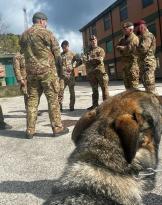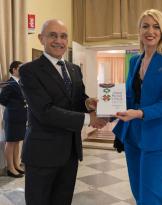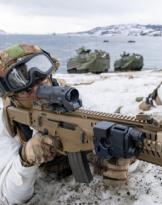On Thursday 28 October, at the conference room of the Accademia dell'Alto Mare, in the naval base in via Acton, the infirmary of the Navy of Naples was named after the major doctor Vincenzo Tiberio. The inauguration saw the affixing of a plaque from 1961, already affixed in the Hospital of the Reale Armata di Mare in Piedigrotta.
With this symbolic act, the Navy intended to commemorate Major Vincenzo Tiberio, soldier, scientist, seaman and skilled doctor who served in the Royal Navy between 1896 and 1915. Tiberio is known to have been an attentive scholar of the chemotactic and bactericidal power of some mold extracts, whose work on the fungal-antibiotic connection predated the discovery of penicillin by Alexander Fleming.
Several speakers, moderated by the journalist Massimo Milone, have outlined the figure of a talented Navy man, who were joined by the testimonies of two family members of the military doctor, the great-grandchildren Giulio Capone and Anna Zuppa Covelli.
During the conference, the more strictly scientific aspects were traced by professor Gennaro Rispoli, director of the Museum of Sanitary Arts in Naples, and by admiral chief inspector Riccardo Guarducci, head of the Navy's Sanitary Corps. The latter, in particular, retracing the years of Vincenzo Tiberio's military career, underlined how "he, in each of his destinations, did his utmost to protect the health of the crews entrusted to him, demonstrating an extraordinarily precursor vision of the current rules of hygiene and preventive medicine. In his work, the qualities of the observer, the method applied to the surveys and attention also to details not immediately involved in the search for a hygienist, who demonstrated the constant ability to combine scientific rigor with the spirit of service typical of a Navy medical officer ".
Chief Inspector Admiral Giuseppe Abbamonte, Logistics Commander of the Navy, brought his greeting to the audience, introducing the great value of Officer Tiberio and his studies: "An expert researcher, an Italian soldier who has made a great contribution to the fight against infections, a still current example for our medical officers. The keen intuition and careful critical eye characterizing the work of Vincenzo Tiberio bring to our attention a singular parallelism between his history, private and professional, and that of his nephew Ugo Tiberio, officer of the Corps of Naval Arms of the Regia Marina, whose studies led him to write the "Equation of the Radar". Both united by a singular and little lucky destiny, that of not seeing their great and brilliant intuitions and discoveries recognized by their contemporary compatriots, ensuring that fame and honors for the discoveries resulting from their tireless work and their genius, were reserved for scientists and researchers of other nationalities ".












